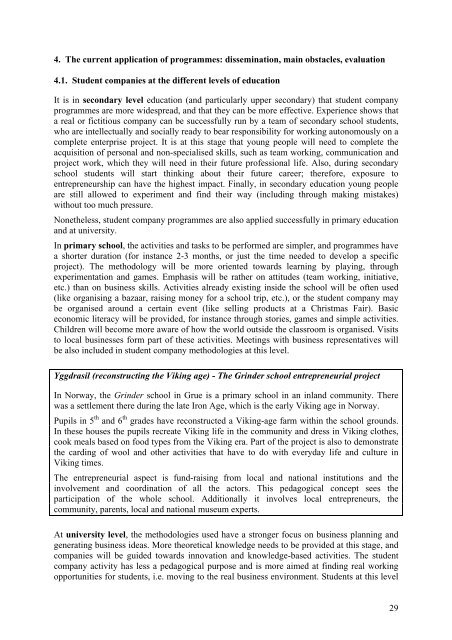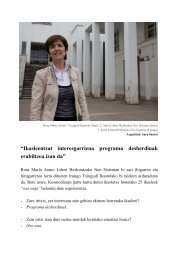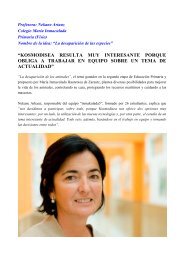Final Report of the Expert Group - European Commission - Europa
Final Report of the Expert Group - European Commission - Europa
Final Report of the Expert Group - European Commission - Europa
Create successful ePaper yourself
Turn your PDF publications into a flip-book with our unique Google optimized e-Paper software.
4. The current application <strong>of</strong> programmes: dissemination, main obstacles, evaluation4.1. Student companies at <strong>the</strong> different levels <strong>of</strong> educationIt is in secondary level education (and particularly upper secondary) that student companyprogrammes are more widespread, and that <strong>the</strong>y can be more effective. Experience shows thata real or fictitious company can be successfully run by a team <strong>of</strong> secondary school students,who are intellectually and socially ready to bear responsibility for working autonomously on acomplete enterprise project. It is at this stage that young people will need to complete <strong>the</strong>acquisition <strong>of</strong> personal and non-specialised skills, such as team working, communication andproject work, which <strong>the</strong>y will need in <strong>the</strong>ir future pr<strong>of</strong>essional life. Also, during secondaryschool students will start thinking about <strong>the</strong>ir future career; <strong>the</strong>refore, exposure toentrepreneurship can have <strong>the</strong> highest impact. <strong>Final</strong>ly, in secondary education young peopleare still allowed to experiment and find <strong>the</strong>ir way (including through making mistakes)without too much pressure.None<strong>the</strong>less, student company programmes are also applied successfully in primary educationand at university.In primary school, <strong>the</strong> activities and tasks to be performed are simpler, and programmes havea shorter duration (for instance 2-3 months, or just <strong>the</strong> time needed to develop a specificproject). The methodology will be more oriented towards learning by playing, throughexperimentation and games. Emphasis will be ra<strong>the</strong>r on attitudes (team working, initiative,etc.) than on business skills. Activities already existing inside <strong>the</strong> school will be <strong>of</strong>ten used(like organising a bazaar, raising money for a school trip, etc.), or <strong>the</strong> student company maybe organised around a certain event (like selling products at a Christmas Fair). Basiceconomic literacy will be provided, for instance through stories, games and simple activities.Children will become more aware <strong>of</strong> how <strong>the</strong> world outside <strong>the</strong> classroom is organised. Visitsto local businesses form part <strong>of</strong> <strong>the</strong>se activities. Meetings with business representatives willbe also included in student company methodologies at this level.Yggdrasil (reconstructing <strong>the</strong> Viking age) - The Grinder school entrepreneurial projectIn Norway, <strong>the</strong> Grinder school in Grue is a primary school in an inland community. Therewas a settlement <strong>the</strong>re during <strong>the</strong> late Iron Age, which is <strong>the</strong> early Viking age in Norway.Pupils in 5 th and 6 th grades have reconstructed a Viking-age farm within <strong>the</strong> school grounds.In <strong>the</strong>se houses <strong>the</strong> pupils recreate Viking life in <strong>the</strong> community and dress in Viking clo<strong>the</strong>s,cook meals based on food types from <strong>the</strong> Viking era. Part <strong>of</strong> <strong>the</strong> project is also to demonstrate<strong>the</strong> carding <strong>of</strong> wool and o<strong>the</strong>r activities that have to do with everyday life and culture inViking times.The entrepreneurial aspect is fund-raising from local and national institutions and <strong>the</strong>involvement and coordination <strong>of</strong> all <strong>the</strong> actors. This pedagogical concept sees <strong>the</strong>participation <strong>of</strong> <strong>the</strong> whole school. Additionally it involves local entrepreneurs, <strong>the</strong>community, parents, local and national museum experts.At university level, <strong>the</strong> methodologies used have a stronger focus on business planning andgenerating business ideas. More <strong>the</strong>oretical knowledge needs to be provided at this stage, andcompanies will be guided towards innovation and knowledge-based activities. The studentcompany activity has less a pedagogical purpose and is more aimed at finding real workingopportunities for students, i.e. moving to <strong>the</strong> real business environment. Students at this level29




